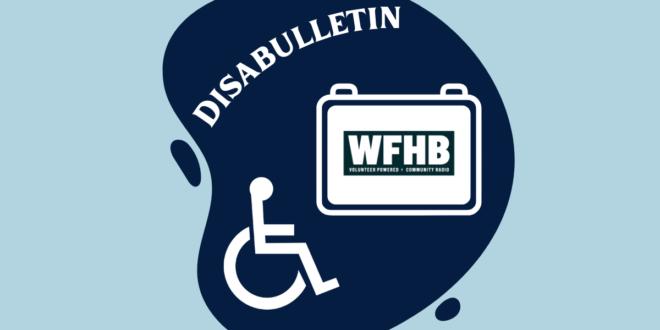Podcast: Play in new window | Download (Duration: 6:33 — 6.1MB)
Subscribe: RSS
Good evening, I’m Abe Shapiro and this is your disability News Briefing.
Paula Goldberg, Minnesota advocate for kids with disabilities, dies at 79, MPR NEWS, May 16,2022
“Paula Goldberg, a national representative renowned for her advocacy on behalf children with disabilities died Sunday at age 79.
In 1977, Goldberg co-founded and served as executive director of the PACER Center, an organization dedicated to connecting parents of children with disabilities.”
In a statement to Minnesota Public Radio, PACER Board Member Kathy Graves lamented that “It is a blow,” “She’s not like one in a million, she’s like one in 10 million.” Graves went on to call the late Goldberg “an extraordinary person and described her passing as “It’s a tremendous loss to the disability world.”
PACER runs more than 30 programs targeted to parents, students and professionals working within the disability community.
Ed Dept. to Update Section 504 on Protecting Children With Disabilities, The 74 News, May 6,2022
“The U.S. Department of Education plans to update a 45-year-old civil rights law meant to protect students with disabilities from discrimination. The department this month will begin collecting public comments on what is known as Section 504, which applies to students with physical or mental health needs who might not qualify for special education under the Individuals with Disabilities Education Act.
Special education experts say there’s wide variation in how school districts accommodate students’ needs in the classroom and that parents are often in the dark about their children’s rights under 504.”
“While the world has undergone enormous changes since 1977, the Department’s Section 504 regulations have remained, with few exceptions, unaltered,” said Assistant Secretary for Civil Rights Catherine E. Lhamon in a press release. “As we observe the 45th anniversary of these important regulations this month, it is time to start the process of updating them. Just as in 1977, the voices of people with disabilities must be heard and incorporated as we engage in that work.”
In April 1977, hundreds of people with disabilities and their supporters held protests at several of the regional offices of the Department of Education’s predecessor agency the Department of Health Education and Welfare, demanding that the agency approve the long-delayed non-discrimination regulations implementing Section 504 to protect the civil rights of people with disabilities, which were signed on May 9 of that same year.
LAUSD passes controversial deaf education plan despite strong opposition, Los Angeles Times, May 10–11, 2022
The Los Angeles Unified School District voted on a controversial proposal to reshape education for thousands of deaf and hard-of-hearing students on Tuesday.
Resolution 029-21/22, which will create a new deaf and hard-of-hearing education department within the district’s special education program.
The resolution also places American Sign Language into the district’s dual-language and bilingual program and makes ASL-English bilingual education the districtwide standard for early intervention with deaf and hard-of-hearing students.
“Supporters say the move addresses the district’s urgent need for language equity while Opponents decry it as a violation of their parental rights. LAUSD board member Jackie Goldberg stated to the LA Times, “This is not a motion to avoid options, this is an opportunity to make sure that everyone gets all options presented, which both sides tell me is currently not the case.”
On the opposition side, Los Angeles Mayoral Candidate Rick Caruso “expressed disappointment in the decision and that bilingual instruction is obsolete for the youngest deaf learners, who almost universally receive cochlear implants allowing the majority to listen and speak.”
On the medical side, “experts point out that not every family has the same access to high-quality, well-fitted hearing aids, or to the surgical revisions and training necessary to use a cochlear implant successfully. Nor can families predict ahead of time how well an implant will ultimately work, or what degree of hearing the child will retain over time.” In a May 10 statement to the LA Times, Tawny Holmes Hlibok, the language planning and policy counsel at Gallaudet University explained, “You need a lot of services, and Medicaid doesn’t fully cover that,” Children under 5 “who got technical devices might still have struggled with acquisition of language.
Barbie To Add More Dolls With Disabilities,DisabilityScoop, May 17,2022
“Mattel said this month that it was releasing the first Barbie doll with behind-the-ear hearing aids. The toymaker is also introducing a new doll with a prosthetic leg.
The offerings are part of the Fashionistas collection, which includes over 175 looks that vary in skin tone, eye color, hair color and texture, body type, disability and fashion, Mattel said.
In a statement to Disability Scoop, one of the nation’s largest news organizations devoted to covering developmental disabilities outlet for developmental disability, Mattel executive vice president and global head of Barbie Lisa McKnight said “Barbie wholeheartedly believes in the power of representation, and as the most diverse doll line on the market, we are committed to continuing to introduce dolls featuring a range of skin tones, body types and disabilities to reflect the diversity kids see in the world around them.”
Almost one billion children and adults with disabilities and older persons in need of assistive technology are denied access, according to new report, World Health Organization, May 16,2022
A new report published yesterday by WHO and UNICEF, “reveals that more than 2.5 billion people need one or more assistive products, such as wheelchairs, hearing aids, or apps that support communication and cognition. Yet nearly one billion of them are denied access, particularly in low- and middle-income countries, where access can be as low as 3% of the need for these life-changing products.
According to WHO, the report notes that the number of people in need of one or more assistive products is likely to rise to 3.5 billion by 2050, due to populations aging and the prevalence of noncommunicable diseases rising across the world. The report also highlights the vast gap in access between low- and high-income countries. An analysis of 35 countries reveals that access varies from 3% in poorer nations to 90% in wealthy countries.
Affordability is a major barrier to access, the report notes. Around two thirds of people with assistive products reported out-of-pocket payments for them. Others reported relying on family and friends to financially support their needs.”
That’s all for this week’s disability news headlines. Abe Shapiro WFHB news, live and learn!
 WFHB Bloomington Community Radio
WFHB Bloomington Community Radio


